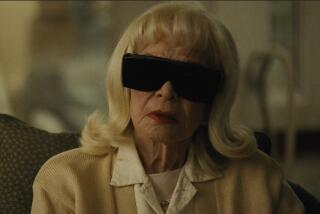Book review: ‘Room’ by Emma Donoghue
- Share via
The more you know about Emma Donoghue’s ninth novel, “Room,” the harder it is to assess.
That’s a tricky issue, since “Room” is one of the hot books of the moment: shortlisted for the Man Booker Prize, with coverage everywhere. If you’ve heard about it, you know the setup: The novel is narrated by a 5-year-old boy named Jack, who was born and has spent his entire life in a room (a fortified garden shed, really) with his mother, imprisoned by the man who kidnapped her seven years before.
For Ma, life in Room — which is what Jack calls their zone of containment — is an ongoing torment, mitigated only by the desire to protect her son. For Jack, the situation is somewhat different, since Room is the only world he’s ever known. Each is the other’s one connection to what we might call normal life. “Women aren’t real like Ma is,” Jack explains early in the novel, “and girls and boys not either.”
These are the basics, which we learn in the first 30 or 40 pages of the book. Still, to have even that small bit of information irrevocably alters how we engage with the work.
The conceit of “Room,” after all, is to unfold slowly, piece by piece. This is one reason to have a child narrate the novel: to connect us with a mind of which we are not completely certain, so that we need to decode the voice and the story it tells.
Once we know the framework, we lose a kind of purity, an unfettered relationship with the text. That’s not Donoghue’s fault, but it does make for an inadvertent irony, in which the best way to read “Room” may be in a Room of the imagination, a literary isolation chamber, if you will.
As to why this is important, “Room” depends entirely on voice to be successful, and voice is a fragile thing. Push too far in one direction and it becomes a gimmick, too far in the other and it grows obscure.
Of course, it is a gimmick to have a 5-year-old narrate a novel, just as it was for Alice Sebold to write “The Lovely Bones” from the perspective of a 14-year-old girl who had been raped and killed. And yet, like Sebold, Donoghue has other aspirations than merely to see if she can pull it off.
Apparently inspired by the experiences of Elisabeth Fritzl and Jaycee Dugard — both of whom were held for many years by captors (in Fritzl’s case, her father) by whom they bore children — she has said that to frame this story through a mother’s eyes “would be too obviously sad.”
With Jack, however, the question of confinement becomes more nuanced, since he has no experience of “Outside.” Early in the novel, Ma tries to explain; “There’s more things on earth than you ever dreamed about,” she says. “That’s ridiculous,” Jack thinks, “Ma was never in Outside.” It’s a telling moment, both because of the limits of the boy’s imagination and the precociousness of his thinking, his ability to conceptualize the world (such as it is) around him and give it an interpretation all his own.
Such a double vision is essential to Donoghue’s intentions, but it doesn’t always work.
At times, we’re right with Jack, as when he notes that “[i]n Room me and Ma had time for everything. I guess the time gets spread very thin like butter over all the world … so there’s only a little smear of time on each place, then everyone has to hurry on to the next bit.” This observation comes late in the book, after he has learned more about Outside, but what makes it resonant is that it draws us, almost without thinking, into both his language and his point of view.
Not so effective are those moments when he is less in his head, more directly engaged with his environment, especially the two major plot turns, coming about a third and two-thirds of the way through the novel, in which his bond with Ma is tested and he must (literally and figuratively) strike out on his own.
I’m being purposely vague because I don’t want to give away more of the story than is necessary; here too there is an element of surprise, of discovery, meant to alter how we think of not just the narrative but also Jack himself.
Still, in both big shifts — and they are big shifts — things unfold too quickly, without sufficient context, inconsistent with how the characters behave. “We’re like people in a book, and he won’t let anybody else read it,” Ma offers, in a brief metafictional aside. But even as Jack considers “how … people in a book escape from it,” we wonder at his ability to make sense of everything.
To mitigate that, perhaps, Donoghue repeatedly cites children’s stories — primarily “Alice’s Adventures in Wonderland” and “Jack and the Beanstalk,” both of which echo the novel in certain ways. Where are Jack and Ma, after all, if not down the rabbit hole, or under the sway of a capricious giant, who feeds on their fear?
Yet for all that Jack (in the case of “Room,” as well as the beanstalk) tries to help his mother, the broader associations get a little tangled, especially when it comes to Alice, who was both a wise child and, like Ma, from a different place. “I’m like Alice,” Ma tells Jack. “…I’m from somewhere else, like her.”
Clearly, Donoghue means to dramatize the back story of every fairy tale: the cautionary saga, the darkness at the center of the world. But if “Room” vividly evokes these dangers, it is, in the end, too limited in its point of view.
“When I was a little kid, I thought like a little kid,” Jack tells us, “but now I’m five I know everything.” Maybe so, but that’s a tall order for any 5-year-old, and even more for one who has spent his life within the walls of Room.
david.ulin@latimes.com
More to Read
Sign up for our Book Club newsletter
Get the latest news, events and more from the Los Angeles Times Book Club, and help us get L.A. reading and talking.
You may occasionally receive promotional content from the Los Angeles Times.











